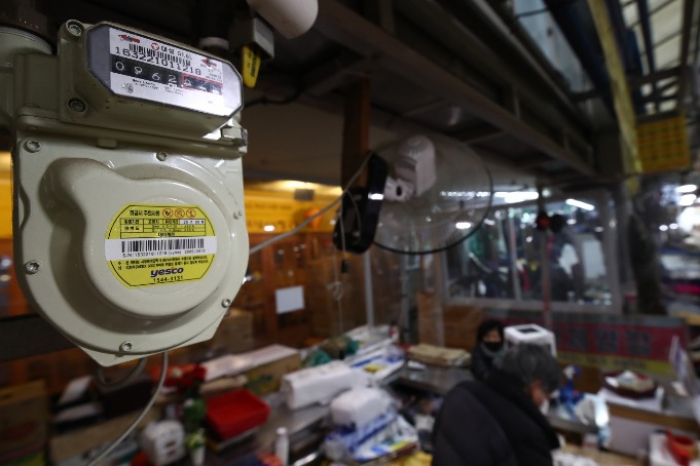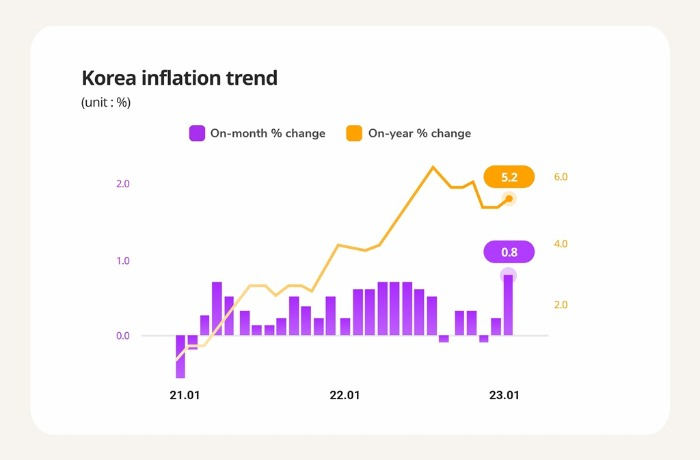Economy
Korea’s inflation picks up 5.2% in January on high utility prices
Utility price gains mainly drove the acceleration in inflation, but the gain comes in the BOK’s expectation
By Feb 02, 2023 (Gmt+09:00)
3
Min read
Most Read
LG Chem to sell water filter business to Glenwood PE for $692 million


Kyobo Life poised to buy Japan’s SBI Group-owned savings bank


KT&G eyes overseas M&A after rejecting activist fund's offer


StockX in merger talks with Naver’s online reseller Kream


Mirae Asset to be named Korea Post’s core real estate fund operator



South Korea’s headline inflation accelerated 5.2% year on year in January, reversing its course of slowing in the past two months due to gains in utility prices but the growth came in the central bank’s expectation, raising hopes for the central bank's rate hold amid growing concerns over the economy.
Consumer prices in January advanced 5.2% from a year ago, accelerating from 5% in December, according to data from Korea Statistics on Thursday. From a month earlier, it added 0.8%. Core inflation, which excludes agricultural and oil-related products, gained 5.0% from the same month last year versus a 4.8% gain in December, and the advance was the biggest since February 2009 when it jumped 5.2%.
The rebound in consumer prices was a reversal from the slowdown in the country’s inflation in November and December, stopping at 5.0%, each, versus a 5.7% gain in October.

Korea’s inflation quickened in January mainly due to hikes in utility service prices, according to the statistics office. Electricity, gas and water price reading in January jumped 28.3% from the same period of last year, the highest-ever increase since the related data started to be compiled in 2010.
In particular electricity bills in the month surged 29.5% year over year, while gas and heating costs soared 36.2% and 34.0%, respectively, due to runaway energy prices from the prolonged Russia-Ukraine war.
To reflect such high energy prices, the Korean government hiked electricity bills in April, July, October and December last year.
The Ministry of Trade, Industry and Energy previously announced electricity bills would be hiked by 13.1 won ($0.01) per kilowatt hour (kWh) in the first quarter this year. The government increased the cost 19.3 won throughout last year.
The contribution of utility service costs to the country’s inflation gain in January was 0.94 percentage point, higher than those of petroleum products (0.23) and processed foods (0.89), which were the main drivers of the country’s inflation acceleration last year.
As the country’s utility bills are set to rise further, its inflation is expected to remain in the 5 percent range or higher for the year, which is much higher than the Bank of Korea’s medium-term inflation target of 2 percent.
BOK, RATE PAUSE
With inflation pressure expected to remain high for the rest of this year, the country's central bank will likely maintain its tightening move for a while despite a slew of signs indicating an economic slowdown, including the country’s poor exports in January.
But it is expected to pause its rate hike in the next policy rate-setting meeting as the central bank said the latest inflation data came in line with its expectation on Thursday.
“The gain in petroleum prices slowed down in January but inflation rebounded on month due to hikes in electricity bills and agricultural prices from the cold snap,” Lee Hwan-seok, deputy governor of the Bank of Korea, said on Thursday. “Inflation moved in line with expectations.”
Lee forecast the country’s consumer prices to stay around 5% in February, and inflation move would hinge on the reopening speedy of the Chinese economy, the global commodity price trend, and the economic conditions at home and abroad amid growing uncertainty.
The Bank of Korea raised its policy interest rate by a quarter percentage point to 3.50% in its first rate-setting meeting in January for this year. After the central bank made its seventh hike in less than a year, some analysts projected the bank may end its tightening move earlier than expected.
The statistic office expected the inflation would slow in the latter half of this year but market analysts forecast the country’s inflation would exceed the government’s target of 3.5% for this year.
PRICE MOVES BY SECTOR
The price of agricultural, fisheries and livestock products added 1.1% year on year in January against a 0.3% rise in the previous month.
Industrial product prices jumped 6%, while the price of personal services gained 5.9%. Costs of dining out rose 7.7%.
Core inflation, which excludes volatile food and energy prices, gained 4.1% year on year in January, unchanged from December.
Write to Byung-Uk Do at dodo@hankyung.com
Sookyung Seo edited this article.
More to Read
-
 EconomyS.Korea likely to suffer recession as Jan exports tumble
EconomyS.Korea likely to suffer recession as Jan exports tumbleFeb 01, 2023 (Gmt+09:00)
3 Min read -
 Central bankBOK mulls business, financial stability this year while focusing on inflation
Central bankBOK mulls business, financial stability this year while focusing on inflationJan 19, 2023 (Gmt+09:00)
1 Min read -
 EconomyKorea inflation at 7-mth low; BOK may slow rate hike pace
EconomyKorea inflation at 7-mth low; BOK may slow rate hike paceDec 02, 2022 (Gmt+09:00)
2 Min read
Comment 0
LOG IN


